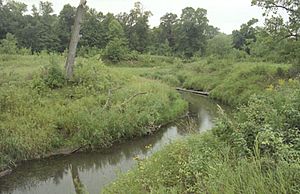Tongue River (North Dakota) facts for kids

The Tongue River is a river in North Dakota, United States. It flows for about 90.4 miles (145.5 kilometers). A river like the Tongue River that flows into a larger river is called a tributary. The Tongue River is a tributary of the Pembina River.
This river is in the very northeast part of North Dakota. It helps drain, or carry water away from, an area of flat, grassy land called the prairie. This area is close to the border between Canada and the United States. All the land that drains into the Tongue River, and then into the Pembina River, and then into the Red River, is part of the Red River's watershed. A watershed is like a giant bowl where all the rain and snowmelt eventually flow into one main river.
Contents
Where the River Starts and Flows
The Tongue River begins in the eastern part of Cavalier County. From there, it flows mostly east and northeast. It then enters Pembina County.
Towns Along the Way
As the Tongue River travels through North Dakota, it passes by a few towns. These include:
The Tongue River joins the Pembina River from the south. This meeting point is about 2 miles (3.2 kilometers) upstream from where the Pembina River itself flows into the Red River.
Icelandic State Park
Before it reaches the town of Cavalier, the Tongue River flows through Icelandic State Park. This park is a fun place to visit!
Lake Renwick
Inside Icelandic State Park, there is a dam called Renwick Dam. This dam holds back the water of the Tongue River, creating a lake called Lake Renwick. Lakes created by dams are often used for recreation like fishing and boating.
Gunlogson Arboretum Nature Preserve
Below Renwick Dam, you can find the Gunlogson Arboretum Nature Preserve. An arboretum is a place where many different kinds of trees and plants are grown. In this preserve, there are walking trails that follow along the river. It's a great spot to explore nature and see different plants.

